Hospitality Provisions: Roles, Integration, and Business Plan Analysis
VerifiedAdded on 2023/04/21
|16
|5548
|430
Report
AI Summary
This report delves into the multifaceted role of the hospitality industry within the travel and tourism sector. It begins by outlining the responsibilities of hospitality professionals, such as assistant managers, in enhancing customer satisfaction through services like accommodation, business meetings, and leisure activities. The report then examines the interrelationship between the hospitality industry and the broader travel and tourism business, including the significance of customer relationship management and the impact of internationalization and globalization on the hospitality sector. Furthermore, it analyzes the implications of integration within the industry, detailing its positive impacts like exposure to diverse cultures, market expansion, technological advancements, and job creation. The report also discusses how integration affects hospitality businesses by providing competitive advantages and potentially leading to market monopolies. Finally, it proposes a business plan for a hospitality venture, outlining operational requirements and organizational structure, including human resource allocation, with a focus on the target market.
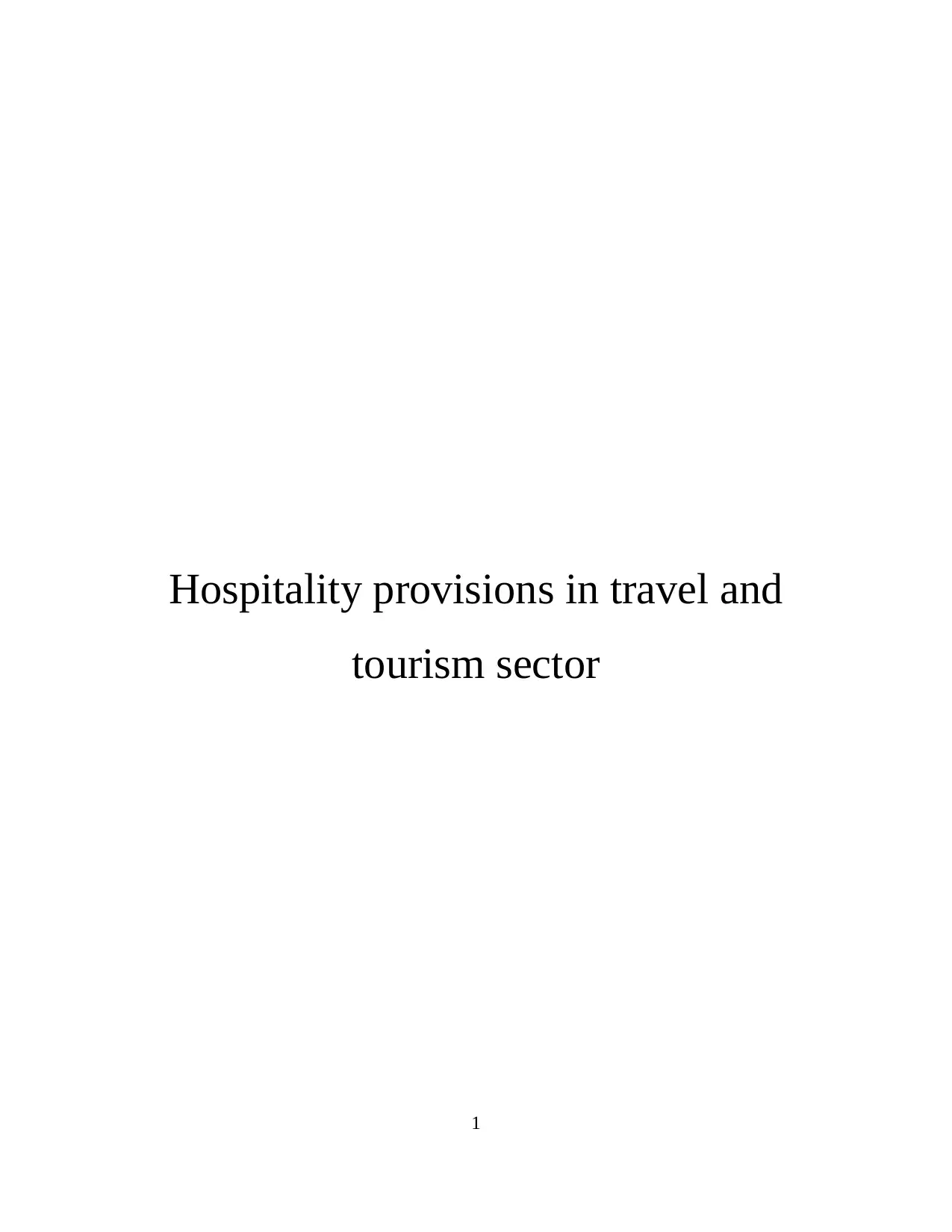
Hospitality provisions in travel and
tourism sector
1
tourism sector
1
Paraphrase This Document
Need a fresh take? Get an instant paraphrase of this document with our AI Paraphraser
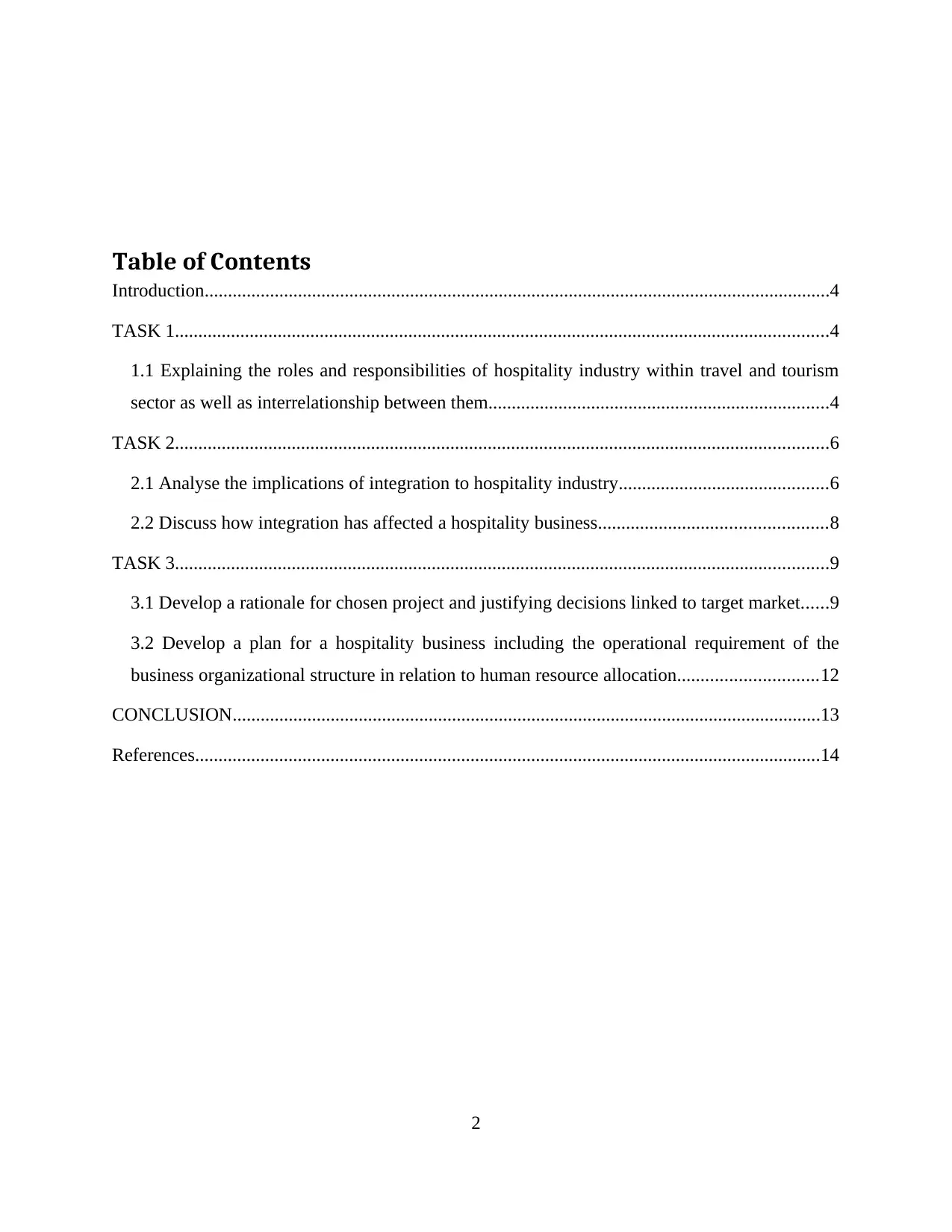
Table of Contents
Introduction......................................................................................................................................4
TASK 1............................................................................................................................................4
1.1 Explaining the roles and responsibilities of hospitality industry within travel and tourism
sector as well as interrelationship between them.........................................................................4
TASK 2............................................................................................................................................6
2.1 Analyse the implications of integration to hospitality industry.............................................6
2.2 Discuss how integration has affected a hospitality business.................................................8
TASK 3............................................................................................................................................9
3.1 Develop a rationale for chosen project and justifying decisions linked to target market......9
3.2 Develop a plan for a hospitality business including the operational requirement of the
business organizational structure in relation to human resource allocation..............................12
CONCLUSION..............................................................................................................................13
References......................................................................................................................................14
2
Introduction......................................................................................................................................4
TASK 1............................................................................................................................................4
1.1 Explaining the roles and responsibilities of hospitality industry within travel and tourism
sector as well as interrelationship between them.........................................................................4
TASK 2............................................................................................................................................6
2.1 Analyse the implications of integration to hospitality industry.............................................6
2.2 Discuss how integration has affected a hospitality business.................................................8
TASK 3............................................................................................................................................9
3.1 Develop a rationale for chosen project and justifying decisions linked to target market......9
3.2 Develop a plan for a hospitality business including the operational requirement of the
business organizational structure in relation to human resource allocation..............................12
CONCLUSION..............................................................................................................................13
References......................................................................................................................................14
2
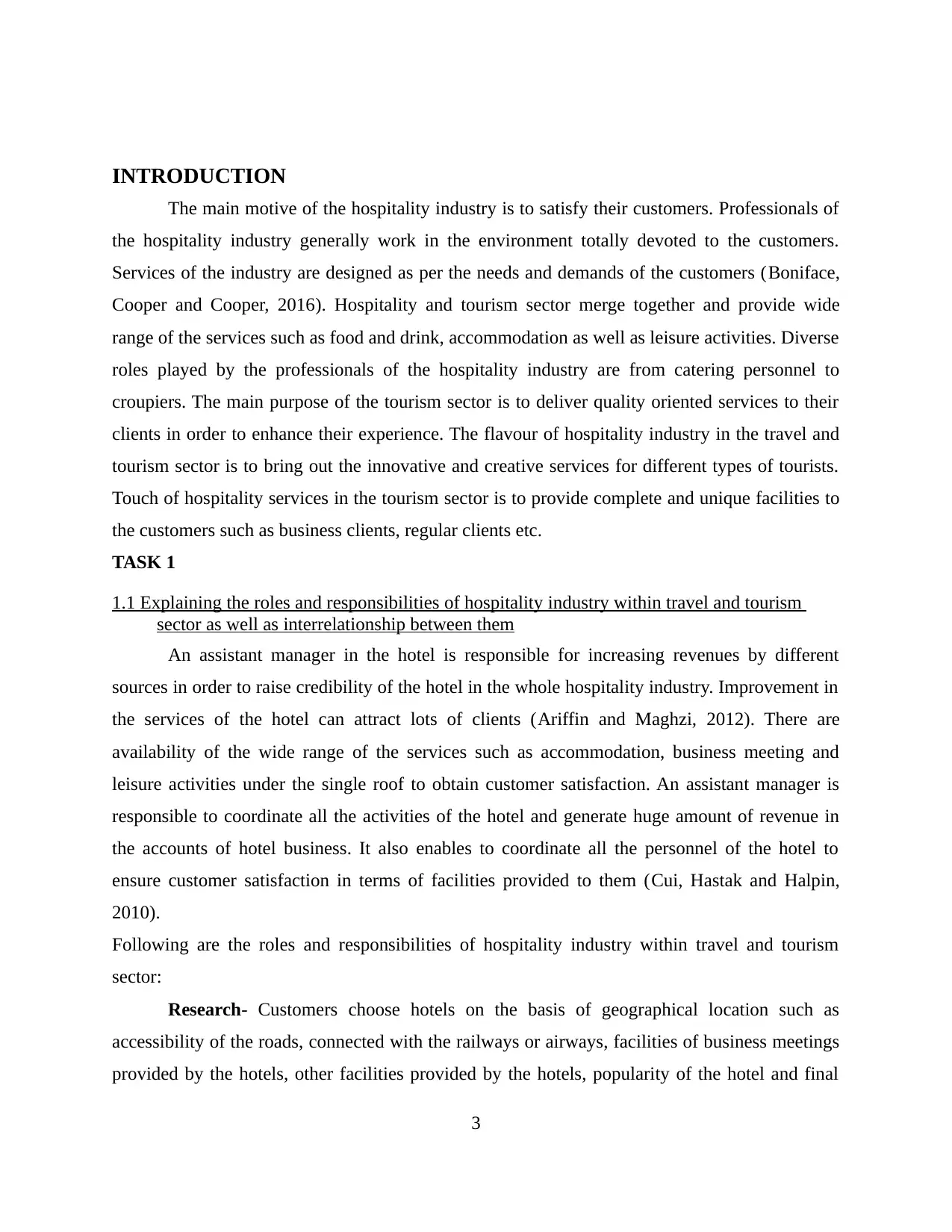
INTRODUCTION
The main motive of the hospitality industry is to satisfy their customers. Professionals of
the hospitality industry generally work in the environment totally devoted to the customers.
Services of the industry are designed as per the needs and demands of the customers (Boniface,
Cooper and Cooper, 2016). Hospitality and tourism sector merge together and provide wide
range of the services such as food and drink, accommodation as well as leisure activities. Diverse
roles played by the professionals of the hospitality industry are from catering personnel to
croupiers. The main purpose of the tourism sector is to deliver quality oriented services to their
clients in order to enhance their experience. The flavour of hospitality industry in the travel and
tourism sector is to bring out the innovative and creative services for different types of tourists.
Touch of hospitality services in the tourism sector is to provide complete and unique facilities to
the customers such as business clients, regular clients etc.
TASK 1
1.1 Explaining the roles and responsibilities of hospitality industry within travel and tourism
sector as well as interrelationship between them
An assistant manager in the hotel is responsible for increasing revenues by different
sources in order to raise credibility of the hotel in the whole hospitality industry. Improvement in
the services of the hotel can attract lots of clients (Ariffin and Maghzi, 2012). There are
availability of the wide range of the services such as accommodation, business meeting and
leisure activities under the single roof to obtain customer satisfaction. An assistant manager is
responsible to coordinate all the activities of the hotel and generate huge amount of revenue in
the accounts of hotel business. It also enables to coordinate all the personnel of the hotel to
ensure customer satisfaction in terms of facilities provided to them (Cui, Hastak and Halpin,
2010).
Following are the roles and responsibilities of hospitality industry within travel and tourism
sector:
Research- Customers choose hotels on the basis of geographical location such as
accessibility of the roads, connected with the railways or airways, facilities of business meetings
provided by the hotels, other facilities provided by the hotels, popularity of the hotel and final
3
The main motive of the hospitality industry is to satisfy their customers. Professionals of
the hospitality industry generally work in the environment totally devoted to the customers.
Services of the industry are designed as per the needs and demands of the customers (Boniface,
Cooper and Cooper, 2016). Hospitality and tourism sector merge together and provide wide
range of the services such as food and drink, accommodation as well as leisure activities. Diverse
roles played by the professionals of the hospitality industry are from catering personnel to
croupiers. The main purpose of the tourism sector is to deliver quality oriented services to their
clients in order to enhance their experience. The flavour of hospitality industry in the travel and
tourism sector is to bring out the innovative and creative services for different types of tourists.
Touch of hospitality services in the tourism sector is to provide complete and unique facilities to
the customers such as business clients, regular clients etc.
TASK 1
1.1 Explaining the roles and responsibilities of hospitality industry within travel and tourism
sector as well as interrelationship between them
An assistant manager in the hotel is responsible for increasing revenues by different
sources in order to raise credibility of the hotel in the whole hospitality industry. Improvement in
the services of the hotel can attract lots of clients (Ariffin and Maghzi, 2012). There are
availability of the wide range of the services such as accommodation, business meeting and
leisure activities under the single roof to obtain customer satisfaction. An assistant manager is
responsible to coordinate all the activities of the hotel and generate huge amount of revenue in
the accounts of hotel business. It also enables to coordinate all the personnel of the hotel to
ensure customer satisfaction in terms of facilities provided to them (Cui, Hastak and Halpin,
2010).
Following are the roles and responsibilities of hospitality industry within travel and tourism
sector:
Research- Customers choose hotels on the basis of geographical location such as
accessibility of the roads, connected with the railways or airways, facilities of business meetings
provided by the hotels, other facilities provided by the hotels, popularity of the hotel and final
3
⊘ This is a preview!⊘
Do you want full access?
Subscribe today to unlock all pages.

Trusted by 1+ million students worldwide
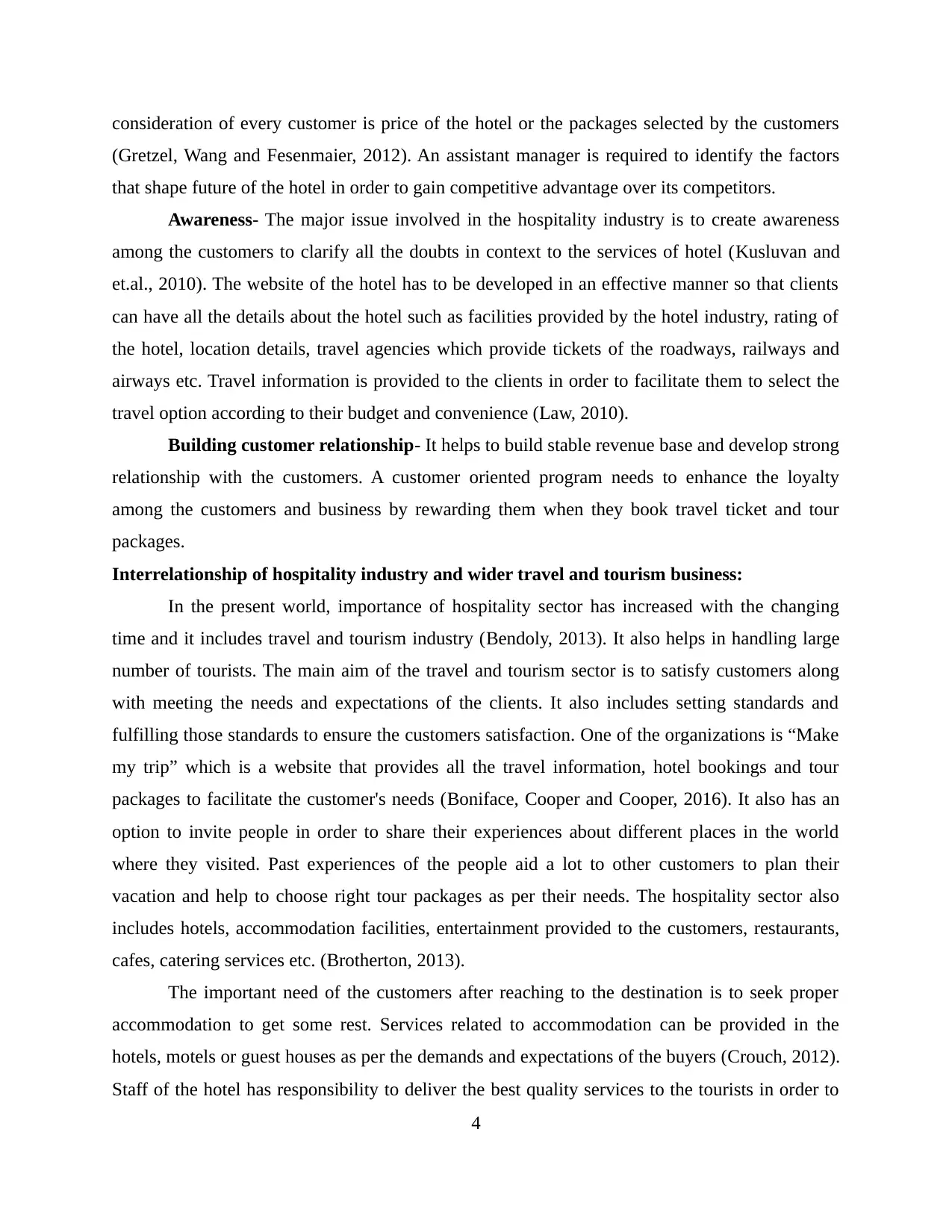
consideration of every customer is price of the hotel or the packages selected by the customers
(Gretzel, Wang and Fesenmaier, 2012). An assistant manager is required to identify the factors
that shape future of the hotel in order to gain competitive advantage over its competitors.
Awareness- The major issue involved in the hospitality industry is to create awareness
among the customers to clarify all the doubts in context to the services of hotel (Kusluvan and
et.al., 2010). The website of the hotel has to be developed in an effective manner so that clients
can have all the details about the hotel such as facilities provided by the hotel industry, rating of
the hotel, location details, travel agencies which provide tickets of the roadways, railways and
airways etc. Travel information is provided to the clients in order to facilitate them to select the
travel option according to their budget and convenience (Law, 2010).
Building customer relationship- It helps to build stable revenue base and develop strong
relationship with the customers. A customer oriented program needs to enhance the loyalty
among the customers and business by rewarding them when they book travel ticket and tour
packages.
Interrelationship of hospitality industry and wider travel and tourism business:
In the present world, importance of hospitality sector has increased with the changing
time and it includes travel and tourism industry (Bendoly, 2013). It also helps in handling large
number of tourists. The main aim of the travel and tourism sector is to satisfy customers along
with meeting the needs and expectations of the clients. It also includes setting standards and
fulfilling those standards to ensure the customers satisfaction. One of the organizations is “Make
my trip” which is a website that provides all the travel information, hotel bookings and tour
packages to facilitate the customer's needs (Boniface, Cooper and Cooper, 2016). It also has an
option to invite people in order to share their experiences about different places in the world
where they visited. Past experiences of the people aid a lot to other customers to plan their
vacation and help to choose right tour packages as per their needs. The hospitality sector also
includes hotels, accommodation facilities, entertainment provided to the customers, restaurants,
cafes, catering services etc. (Brotherton, 2013).
The important need of the customers after reaching to the destination is to seek proper
accommodation to get some rest. Services related to accommodation can be provided in the
hotels, motels or guest houses as per the demands and expectations of the buyers (Crouch, 2012).
Staff of the hotel has responsibility to deliver the best quality services to the tourists in order to
4
(Gretzel, Wang and Fesenmaier, 2012). An assistant manager is required to identify the factors
that shape future of the hotel in order to gain competitive advantage over its competitors.
Awareness- The major issue involved in the hospitality industry is to create awareness
among the customers to clarify all the doubts in context to the services of hotel (Kusluvan and
et.al., 2010). The website of the hotel has to be developed in an effective manner so that clients
can have all the details about the hotel such as facilities provided by the hotel industry, rating of
the hotel, location details, travel agencies which provide tickets of the roadways, railways and
airways etc. Travel information is provided to the clients in order to facilitate them to select the
travel option according to their budget and convenience (Law, 2010).
Building customer relationship- It helps to build stable revenue base and develop strong
relationship with the customers. A customer oriented program needs to enhance the loyalty
among the customers and business by rewarding them when they book travel ticket and tour
packages.
Interrelationship of hospitality industry and wider travel and tourism business:
In the present world, importance of hospitality sector has increased with the changing
time and it includes travel and tourism industry (Bendoly, 2013). It also helps in handling large
number of tourists. The main aim of the travel and tourism sector is to satisfy customers along
with meeting the needs and expectations of the clients. It also includes setting standards and
fulfilling those standards to ensure the customers satisfaction. One of the organizations is “Make
my trip” which is a website that provides all the travel information, hotel bookings and tour
packages to facilitate the customer's needs (Boniface, Cooper and Cooper, 2016). It also has an
option to invite people in order to share their experiences about different places in the world
where they visited. Past experiences of the people aid a lot to other customers to plan their
vacation and help to choose right tour packages as per their needs. The hospitality sector also
includes hotels, accommodation facilities, entertainment provided to the customers, restaurants,
cafes, catering services etc. (Brotherton, 2013).
The important need of the customers after reaching to the destination is to seek proper
accommodation to get some rest. Services related to accommodation can be provided in the
hotels, motels or guest houses as per the demands and expectations of the buyers (Crouch, 2012).
Staff of the hotel has responsibility to deliver the best quality services to the tourists in order to
4
Paraphrase This Document
Need a fresh take? Get an instant paraphrase of this document with our AI Paraphraser
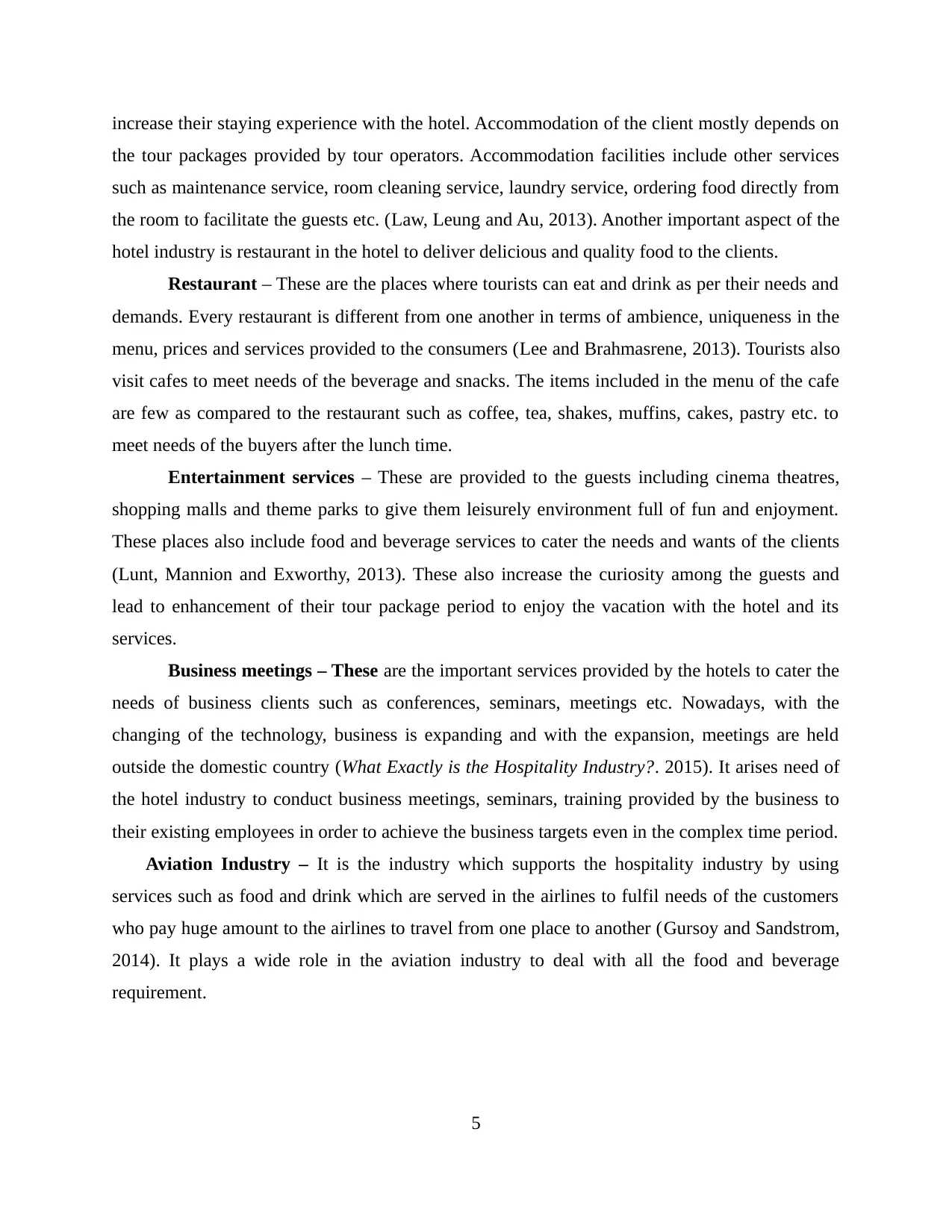
increase their staying experience with the hotel. Accommodation of the client mostly depends on
the tour packages provided by tour operators. Accommodation facilities include other services
such as maintenance service, room cleaning service, laundry service, ordering food directly from
the room to facilitate the guests etc. (Law, Leung and Au, 2013). Another important aspect of the
hotel industry is restaurant in the hotel to deliver delicious and quality food to the clients.
Restaurant – These are the places where tourists can eat and drink as per their needs and
demands. Every restaurant is different from one another in terms of ambience, uniqueness in the
menu, prices and services provided to the consumers (Lee and Brahmasrene, 2013). Tourists also
visit cafes to meet needs of the beverage and snacks. The items included in the menu of the cafe
are few as compared to the restaurant such as coffee, tea, shakes, muffins, cakes, pastry etc. to
meet needs of the buyers after the lunch time.
Entertainment services – These are provided to the guests including cinema theatres,
shopping malls and theme parks to give them leisurely environment full of fun and enjoyment.
These places also include food and beverage services to cater the needs and wants of the clients
(Lunt, Mannion and Exworthy, 2013). These also increase the curiosity among the guests and
lead to enhancement of their tour package period to enjoy the vacation with the hotel and its
services.
Business meetings – These are the important services provided by the hotels to cater the
needs of business clients such as conferences, seminars, meetings etc. Nowadays, with the
changing of the technology, business is expanding and with the expansion, meetings are held
outside the domestic country (What Exactly is the Hospitality Industry?. 2015). It arises need of
the hotel industry to conduct business meetings, seminars, training provided by the business to
their existing employees in order to achieve the business targets even in the complex time period.
Aviation Industry – It is the industry which supports the hospitality industry by using
services such as food and drink which are served in the airlines to fulfil needs of the customers
who pay huge amount to the airlines to travel from one place to another (Gursoy and Sandstrom,
2014). It plays a wide role in the aviation industry to deal with all the food and beverage
requirement.
5
the tour packages provided by tour operators. Accommodation facilities include other services
such as maintenance service, room cleaning service, laundry service, ordering food directly from
the room to facilitate the guests etc. (Law, Leung and Au, 2013). Another important aspect of the
hotel industry is restaurant in the hotel to deliver delicious and quality food to the clients.
Restaurant – These are the places where tourists can eat and drink as per their needs and
demands. Every restaurant is different from one another in terms of ambience, uniqueness in the
menu, prices and services provided to the consumers (Lee and Brahmasrene, 2013). Tourists also
visit cafes to meet needs of the beverage and snacks. The items included in the menu of the cafe
are few as compared to the restaurant such as coffee, tea, shakes, muffins, cakes, pastry etc. to
meet needs of the buyers after the lunch time.
Entertainment services – These are provided to the guests including cinema theatres,
shopping malls and theme parks to give them leisurely environment full of fun and enjoyment.
These places also include food and beverage services to cater the needs and wants of the clients
(Lunt, Mannion and Exworthy, 2013). These also increase the curiosity among the guests and
lead to enhancement of their tour package period to enjoy the vacation with the hotel and its
services.
Business meetings – These are the important services provided by the hotels to cater the
needs of business clients such as conferences, seminars, meetings etc. Nowadays, with the
changing of the technology, business is expanding and with the expansion, meetings are held
outside the domestic country (What Exactly is the Hospitality Industry?. 2015). It arises need of
the hotel industry to conduct business meetings, seminars, training provided by the business to
their existing employees in order to achieve the business targets even in the complex time period.
Aviation Industry – It is the industry which supports the hospitality industry by using
services such as food and drink which are served in the airlines to fulfil needs of the customers
who pay huge amount to the airlines to travel from one place to another (Gursoy and Sandstrom,
2014). It plays a wide role in the aviation industry to deal with all the food and beverage
requirement.
5
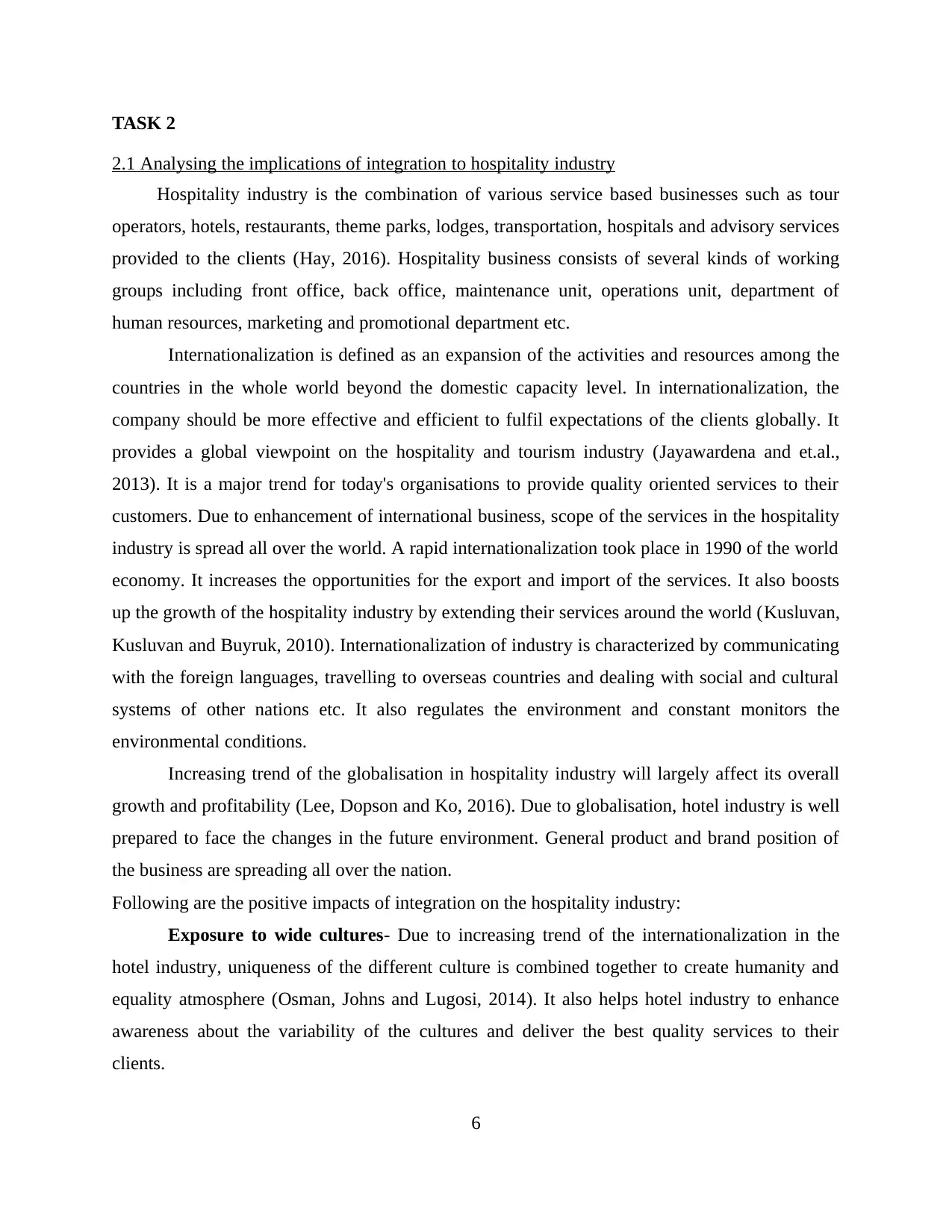
TASK 2
2.1 Analysing the implications of integration to hospitality industry
Hospitality industry is the combination of various service based businesses such as tour
operators, hotels, restaurants, theme parks, lodges, transportation, hospitals and advisory services
provided to the clients (Hay, 2016). Hospitality business consists of several kinds of working
groups including front office, back office, maintenance unit, operations unit, department of
human resources, marketing and promotional department etc.
Internationalization is defined as an expansion of the activities and resources among the
countries in the whole world beyond the domestic capacity level. In internationalization, the
company should be more effective and efficient to fulfil expectations of the clients globally. It
provides a global viewpoint on the hospitality and tourism industry (Jayawardena and et.al.,
2013). It is a major trend for today's organisations to provide quality oriented services to their
customers. Due to enhancement of international business, scope of the services in the hospitality
industry is spread all over the world. A rapid internationalization took place in 1990 of the world
economy. It increases the opportunities for the export and import of the services. It also boosts
up the growth of the hospitality industry by extending their services around the world (Kusluvan,
Kusluvan and Buyruk, 2010). Internationalization of industry is characterized by communicating
with the foreign languages, travelling to overseas countries and dealing with social and cultural
systems of other nations etc. It also regulates the environment and constant monitors the
environmental conditions.
Increasing trend of the globalisation in hospitality industry will largely affect its overall
growth and profitability (Lee, Dopson and Ko, 2016). Due to globalisation, hotel industry is well
prepared to face the changes in the future environment. General product and brand position of
the business are spreading all over the nation.
Following are the positive impacts of integration on the hospitality industry:
Exposure to wide cultures- Due to increasing trend of the internationalization in the
hotel industry, uniqueness of the different culture is combined together to create humanity and
equality atmosphere (Osman, Johns and Lugosi, 2014). It also helps hotel industry to enhance
awareness about the variability of the cultures and deliver the best quality services to their
clients.
6
2.1 Analysing the implications of integration to hospitality industry
Hospitality industry is the combination of various service based businesses such as tour
operators, hotels, restaurants, theme parks, lodges, transportation, hospitals and advisory services
provided to the clients (Hay, 2016). Hospitality business consists of several kinds of working
groups including front office, back office, maintenance unit, operations unit, department of
human resources, marketing and promotional department etc.
Internationalization is defined as an expansion of the activities and resources among the
countries in the whole world beyond the domestic capacity level. In internationalization, the
company should be more effective and efficient to fulfil expectations of the clients globally. It
provides a global viewpoint on the hospitality and tourism industry (Jayawardena and et.al.,
2013). It is a major trend for today's organisations to provide quality oriented services to their
customers. Due to enhancement of international business, scope of the services in the hospitality
industry is spread all over the world. A rapid internationalization took place in 1990 of the world
economy. It increases the opportunities for the export and import of the services. It also boosts
up the growth of the hospitality industry by extending their services around the world (Kusluvan,
Kusluvan and Buyruk, 2010). Internationalization of industry is characterized by communicating
with the foreign languages, travelling to overseas countries and dealing with social and cultural
systems of other nations etc. It also regulates the environment and constant monitors the
environmental conditions.
Increasing trend of the globalisation in hospitality industry will largely affect its overall
growth and profitability (Lee, Dopson and Ko, 2016). Due to globalisation, hotel industry is well
prepared to face the changes in the future environment. General product and brand position of
the business are spreading all over the nation.
Following are the positive impacts of integration on the hospitality industry:
Exposure to wide cultures- Due to increasing trend of the internationalization in the
hotel industry, uniqueness of the different culture is combined together to create humanity and
equality atmosphere (Osman, Johns and Lugosi, 2014). It also helps hotel industry to enhance
awareness about the variability of the cultures and deliver the best quality services to their
clients.
6
⊘ This is a preview!⊘
Do you want full access?
Subscribe today to unlock all pages.

Trusted by 1+ million students worldwide
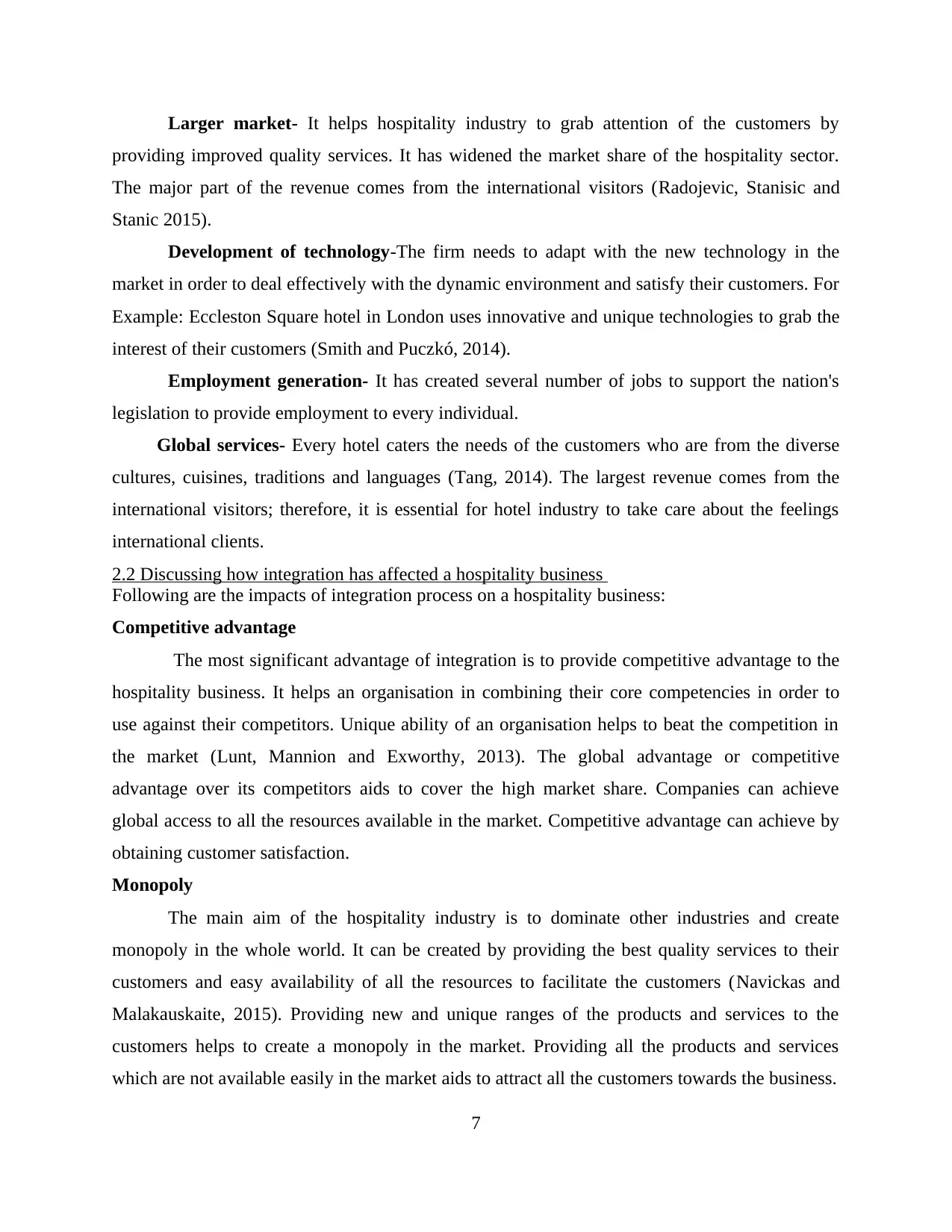
Larger market- It helps hospitality industry to grab attention of the customers by
providing improved quality services. It has widened the market share of the hospitality sector.
The major part of the revenue comes from the international visitors (Radojevic, Stanisic and
Stanic 2015).
Development of technology-The firm needs to adapt with the new technology in the
market in order to deal effectively with the dynamic environment and satisfy their customers. For
Example: Eccleston Square hotel in London uses innovative and unique technologies to grab the
interest of their customers (Smith and Puczkó, 2014).
Employment generation- It has created several number of jobs to support the nation's
legislation to provide employment to every individual.
Global services- Every hotel caters the needs of the customers who are from the diverse
cultures, cuisines, traditions and languages (Tang, 2014). The largest revenue comes from the
international visitors; therefore, it is essential for hotel industry to take care about the feelings
international clients.
2.2 Discussing how integration has affected a hospitality business
Following are the impacts of integration process on a hospitality business:
Competitive advantage
The most significant advantage of integration is to provide competitive advantage to the
hospitality business. It helps an organisation in combining their core competencies in order to
use against their competitors. Unique ability of an organisation helps to beat the competition in
the market (Lunt, Mannion and Exworthy, 2013). The global advantage or competitive
advantage over its competitors aids to cover the high market share. Companies can achieve
global access to all the resources available in the market. Competitive advantage can achieve by
obtaining customer satisfaction.
Monopoly
The main aim of the hospitality industry is to dominate other industries and create
monopoly in the whole world. It can be created by providing the best quality services to their
customers and easy availability of all the resources to facilitate the customers (Navickas and
Malakauskaite, 2015). Providing new and unique ranges of the products and services to the
customers helps to create a monopoly in the market. Providing all the products and services
which are not available easily in the market aids to attract all the customers towards the business.
7
providing improved quality services. It has widened the market share of the hospitality sector.
The major part of the revenue comes from the international visitors (Radojevic, Stanisic and
Stanic 2015).
Development of technology-The firm needs to adapt with the new technology in the
market in order to deal effectively with the dynamic environment and satisfy their customers. For
Example: Eccleston Square hotel in London uses innovative and unique technologies to grab the
interest of their customers (Smith and Puczkó, 2014).
Employment generation- It has created several number of jobs to support the nation's
legislation to provide employment to every individual.
Global services- Every hotel caters the needs of the customers who are from the diverse
cultures, cuisines, traditions and languages (Tang, 2014). The largest revenue comes from the
international visitors; therefore, it is essential for hotel industry to take care about the feelings
international clients.
2.2 Discussing how integration has affected a hospitality business
Following are the impacts of integration process on a hospitality business:
Competitive advantage
The most significant advantage of integration is to provide competitive advantage to the
hospitality business. It helps an organisation in combining their core competencies in order to
use against their competitors. Unique ability of an organisation helps to beat the competition in
the market (Lunt, Mannion and Exworthy, 2013). The global advantage or competitive
advantage over its competitors aids to cover the high market share. Companies can achieve
global access to all the resources available in the market. Competitive advantage can achieve by
obtaining customer satisfaction.
Monopoly
The main aim of the hospitality industry is to dominate other industries and create
monopoly in the whole world. It can be created by providing the best quality services to their
customers and easy availability of all the resources to facilitate the customers (Navickas and
Malakauskaite, 2015). Providing new and unique ranges of the products and services to the
customers helps to create a monopoly in the market. Providing all the products and services
which are not available easily in the market aids to attract all the customers towards the business.
7
Paraphrase This Document
Need a fresh take? Get an instant paraphrase of this document with our AI Paraphraser
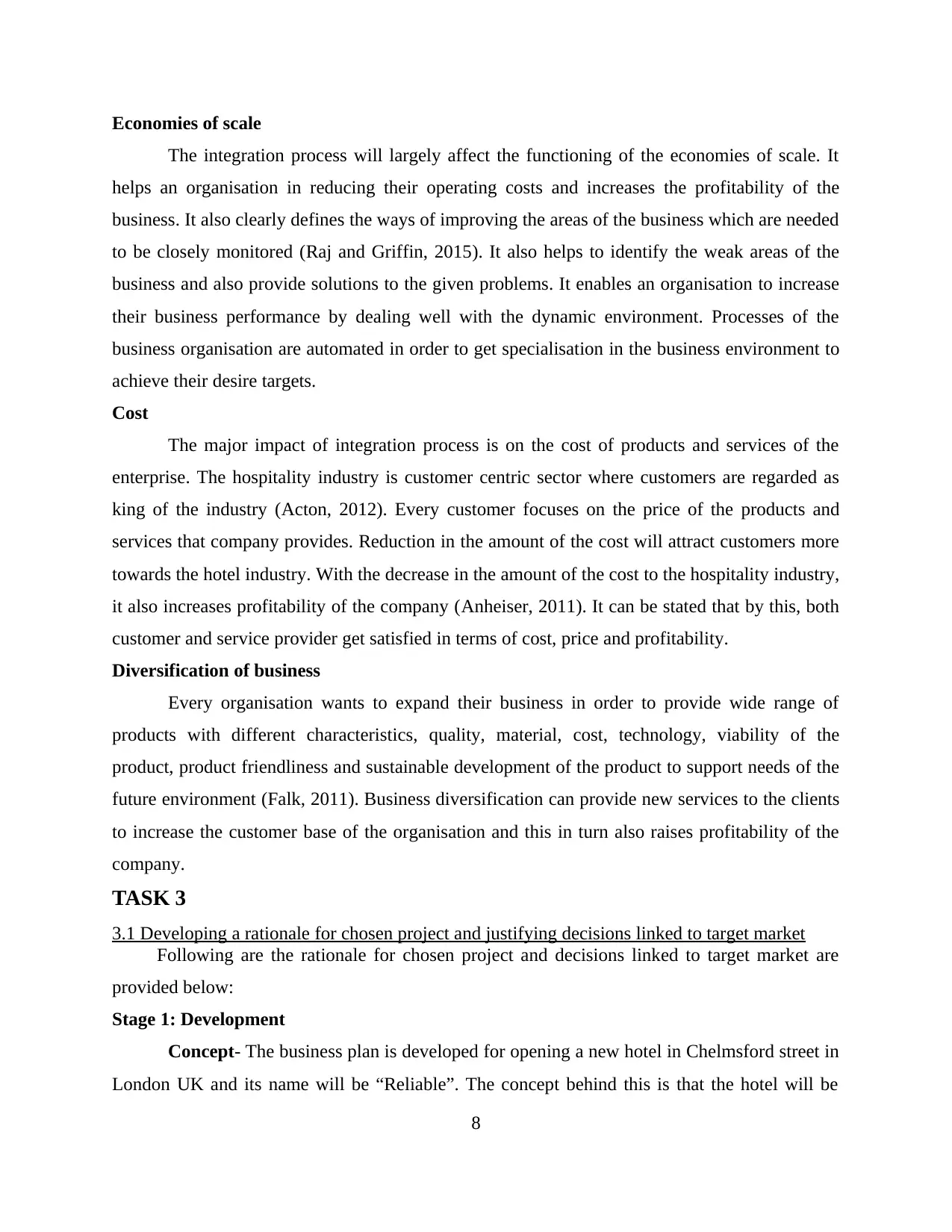
Economies of scale
The integration process will largely affect the functioning of the economies of scale. It
helps an organisation in reducing their operating costs and increases the profitability of the
business. It also clearly defines the ways of improving the areas of the business which are needed
to be closely monitored (Raj and Griffin, 2015). It also helps to identify the weak areas of the
business and also provide solutions to the given problems. It enables an organisation to increase
their business performance by dealing well with the dynamic environment. Processes of the
business organisation are automated in order to get specialisation in the business environment to
achieve their desire targets.
Cost
The major impact of integration process is on the cost of products and services of the
enterprise. The hospitality industry is customer centric sector where customers are regarded as
king of the industry (Acton, 2012). Every customer focuses on the price of the products and
services that company provides. Reduction in the amount of the cost will attract customers more
towards the hotel industry. With the decrease in the amount of the cost to the hospitality industry,
it also increases profitability of the company (Anheiser, 2011). It can be stated that by this, both
customer and service provider get satisfied in terms of cost, price and profitability.
Diversification of business
Every organisation wants to expand their business in order to provide wide range of
products with different characteristics, quality, material, cost, technology, viability of the
product, product friendliness and sustainable development of the product to support needs of the
future environment (Falk, 2011). Business diversification can provide new services to the clients
to increase the customer base of the organisation and this in turn also raises profitability of the
company.
TASK 3
3.1 Developing a rationale for chosen project and justifying decisions linked to target market
Following are the rationale for chosen project and decisions linked to target market are
provided below:
Stage 1: Development
Concept- The business plan is developed for opening a new hotel in Chelmsford street in
London UK and its name will be “Reliable”. The concept behind this is that the hotel will be
8
The integration process will largely affect the functioning of the economies of scale. It
helps an organisation in reducing their operating costs and increases the profitability of the
business. It also clearly defines the ways of improving the areas of the business which are needed
to be closely monitored (Raj and Griffin, 2015). It also helps to identify the weak areas of the
business and also provide solutions to the given problems. It enables an organisation to increase
their business performance by dealing well with the dynamic environment. Processes of the
business organisation are automated in order to get specialisation in the business environment to
achieve their desire targets.
Cost
The major impact of integration process is on the cost of products and services of the
enterprise. The hospitality industry is customer centric sector where customers are regarded as
king of the industry (Acton, 2012). Every customer focuses on the price of the products and
services that company provides. Reduction in the amount of the cost will attract customers more
towards the hotel industry. With the decrease in the amount of the cost to the hospitality industry,
it also increases profitability of the company (Anheiser, 2011). It can be stated that by this, both
customer and service provider get satisfied in terms of cost, price and profitability.
Diversification of business
Every organisation wants to expand their business in order to provide wide range of
products with different characteristics, quality, material, cost, technology, viability of the
product, product friendliness and sustainable development of the product to support needs of the
future environment (Falk, 2011). Business diversification can provide new services to the clients
to increase the customer base of the organisation and this in turn also raises profitability of the
company.
TASK 3
3.1 Developing a rationale for chosen project and justifying decisions linked to target market
Following are the rationale for chosen project and decisions linked to target market are
provided below:
Stage 1: Development
Concept- The business plan is developed for opening a new hotel in Chelmsford street in
London UK and its name will be “Reliable”. The concept behind this is that the hotel will be
8
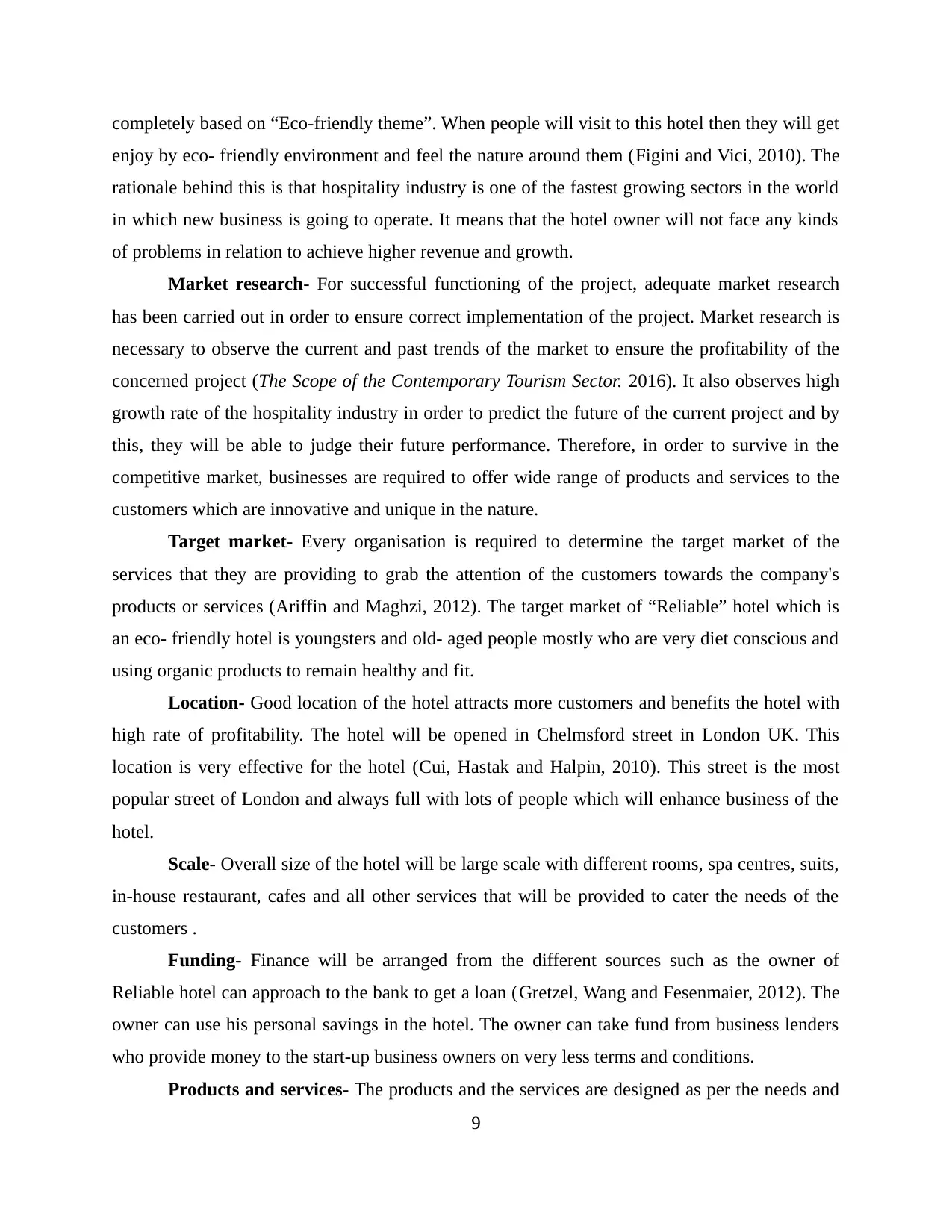
completely based on “Eco-friendly theme”. When people will visit to this hotel then they will get
enjoy by eco- friendly environment and feel the nature around them (Figini and Vici, 2010). The
rationale behind this is that hospitality industry is one of the fastest growing sectors in the world
in which new business is going to operate. It means that the hotel owner will not face any kinds
of problems in relation to achieve higher revenue and growth.
Market research- For successful functioning of the project, adequate market research
has been carried out in order to ensure correct implementation of the project. Market research is
necessary to observe the current and past trends of the market to ensure the profitability of the
concerned project (The Scope of the Contemporary Tourism Sector. 2016). It also observes high
growth rate of the hospitality industry in order to predict the future of the current project and by
this, they will be able to judge their future performance. Therefore, in order to survive in the
competitive market, businesses are required to offer wide range of products and services to the
customers which are innovative and unique in the nature.
Target market- Every organisation is required to determine the target market of the
services that they are providing to grab the attention of the customers towards the company's
products or services (Ariffin and Maghzi, 2012). The target market of “Reliable” hotel which is
an eco- friendly hotel is youngsters and old- aged people mostly who are very diet conscious and
using organic products to remain healthy and fit.
Location- Good location of the hotel attracts more customers and benefits the hotel with
high rate of profitability. The hotel will be opened in Chelmsford street in London UK. This
location is very effective for the hotel (Cui, Hastak and Halpin, 2010). This street is the most
popular street of London and always full with lots of people which will enhance business of the
hotel.
Scale- Overall size of the hotel will be large scale with different rooms, spa centres, suits,
in-house restaurant, cafes and all other services that will be provided to cater the needs of the
customers .
Funding- Finance will be arranged from the different sources such as the owner of
Reliable hotel can approach to the bank to get a loan (Gretzel, Wang and Fesenmaier, 2012). The
owner can use his personal savings in the hotel. The owner can take fund from business lenders
who provide money to the start-up business owners on very less terms and conditions.
Products and services- The products and the services are designed as per the needs and
9
enjoy by eco- friendly environment and feel the nature around them (Figini and Vici, 2010). The
rationale behind this is that hospitality industry is one of the fastest growing sectors in the world
in which new business is going to operate. It means that the hotel owner will not face any kinds
of problems in relation to achieve higher revenue and growth.
Market research- For successful functioning of the project, adequate market research
has been carried out in order to ensure correct implementation of the project. Market research is
necessary to observe the current and past trends of the market to ensure the profitability of the
concerned project (The Scope of the Contemporary Tourism Sector. 2016). It also observes high
growth rate of the hospitality industry in order to predict the future of the current project and by
this, they will be able to judge their future performance. Therefore, in order to survive in the
competitive market, businesses are required to offer wide range of products and services to the
customers which are innovative and unique in the nature.
Target market- Every organisation is required to determine the target market of the
services that they are providing to grab the attention of the customers towards the company's
products or services (Ariffin and Maghzi, 2012). The target market of “Reliable” hotel which is
an eco- friendly hotel is youngsters and old- aged people mostly who are very diet conscious and
using organic products to remain healthy and fit.
Location- Good location of the hotel attracts more customers and benefits the hotel with
high rate of profitability. The hotel will be opened in Chelmsford street in London UK. This
location is very effective for the hotel (Cui, Hastak and Halpin, 2010). This street is the most
popular street of London and always full with lots of people which will enhance business of the
hotel.
Scale- Overall size of the hotel will be large scale with different rooms, spa centres, suits,
in-house restaurant, cafes and all other services that will be provided to cater the needs of the
customers .
Funding- Finance will be arranged from the different sources such as the owner of
Reliable hotel can approach to the bank to get a loan (Gretzel, Wang and Fesenmaier, 2012). The
owner can use his personal savings in the hotel. The owner can take fund from business lenders
who provide money to the start-up business owners on very less terms and conditions.
Products and services- The products and the services are designed as per the needs and
9
⊘ This is a preview!⊘
Do you want full access?
Subscribe today to unlock all pages.

Trusted by 1+ million students worldwide
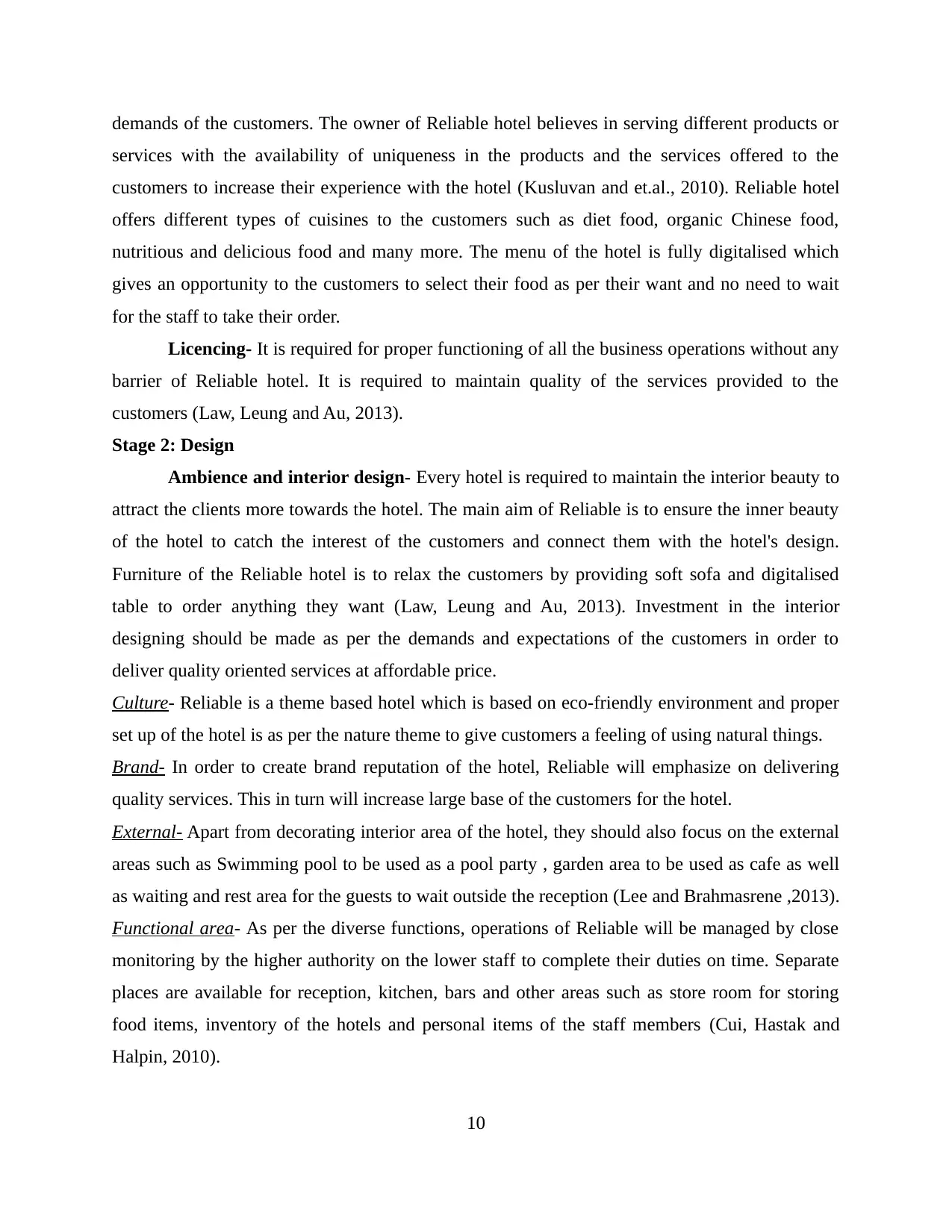
demands of the customers. The owner of Reliable hotel believes in serving different products or
services with the availability of uniqueness in the products and the services offered to the
customers to increase their experience with the hotel (Kusluvan and et.al., 2010). Reliable hotel
offers different types of cuisines to the customers such as diet food, organic Chinese food,
nutritious and delicious food and many more. The menu of the hotel is fully digitalised which
gives an opportunity to the customers to select their food as per their want and no need to wait
for the staff to take their order.
Licencing- It is required for proper functioning of all the business operations without any
barrier of Reliable hotel. It is required to maintain quality of the services provided to the
customers (Law, Leung and Au, 2013).
Stage 2: Design
Ambience and interior design- Every hotel is required to maintain the interior beauty to
attract the clients more towards the hotel. The main aim of Reliable is to ensure the inner beauty
of the hotel to catch the interest of the customers and connect them with the hotel's design.
Furniture of the Reliable hotel is to relax the customers by providing soft sofa and digitalised
table to order anything they want (Law, Leung and Au, 2013). Investment in the interior
designing should be made as per the demands and expectations of the customers in order to
deliver quality oriented services at affordable price.
Culture- Reliable is a theme based hotel which is based on eco-friendly environment and proper
set up of the hotel is as per the nature theme to give customers a feeling of using natural things.
Brand- In order to create brand reputation of the hotel, Reliable will emphasize on delivering
quality services. This in turn will increase large base of the customers for the hotel.
External- Apart from decorating interior area of the hotel, they should also focus on the external
areas such as Swimming pool to be used as a pool party , garden area to be used as cafe as well
as waiting and rest area for the guests to wait outside the reception (Lee and Brahmasrene ,2013).
Functional area- As per the diverse functions, operations of Reliable will be managed by close
monitoring by the higher authority on the lower staff to complete their duties on time. Separate
places are available for reception, kitchen, bars and other areas such as store room for storing
food items, inventory of the hotels and personal items of the staff members (Cui, Hastak and
Halpin, 2010).
10
services with the availability of uniqueness in the products and the services offered to the
customers to increase their experience with the hotel (Kusluvan and et.al., 2010). Reliable hotel
offers different types of cuisines to the customers such as diet food, organic Chinese food,
nutritious and delicious food and many more. The menu of the hotel is fully digitalised which
gives an opportunity to the customers to select their food as per their want and no need to wait
for the staff to take their order.
Licencing- It is required for proper functioning of all the business operations without any
barrier of Reliable hotel. It is required to maintain quality of the services provided to the
customers (Law, Leung and Au, 2013).
Stage 2: Design
Ambience and interior design- Every hotel is required to maintain the interior beauty to
attract the clients more towards the hotel. The main aim of Reliable is to ensure the inner beauty
of the hotel to catch the interest of the customers and connect them with the hotel's design.
Furniture of the Reliable hotel is to relax the customers by providing soft sofa and digitalised
table to order anything they want (Law, Leung and Au, 2013). Investment in the interior
designing should be made as per the demands and expectations of the customers in order to
deliver quality oriented services at affordable price.
Culture- Reliable is a theme based hotel which is based on eco-friendly environment and proper
set up of the hotel is as per the nature theme to give customers a feeling of using natural things.
Brand- In order to create brand reputation of the hotel, Reliable will emphasize on delivering
quality services. This in turn will increase large base of the customers for the hotel.
External- Apart from decorating interior area of the hotel, they should also focus on the external
areas such as Swimming pool to be used as a pool party , garden area to be used as cafe as well
as waiting and rest area for the guests to wait outside the reception (Lee and Brahmasrene ,2013).
Functional area- As per the diverse functions, operations of Reliable will be managed by close
monitoring by the higher authority on the lower staff to complete their duties on time. Separate
places are available for reception, kitchen, bars and other areas such as store room for storing
food items, inventory of the hotels and personal items of the staff members (Cui, Hastak and
Halpin, 2010).
10
Paraphrase This Document
Need a fresh take? Get an instant paraphrase of this document with our AI Paraphraser
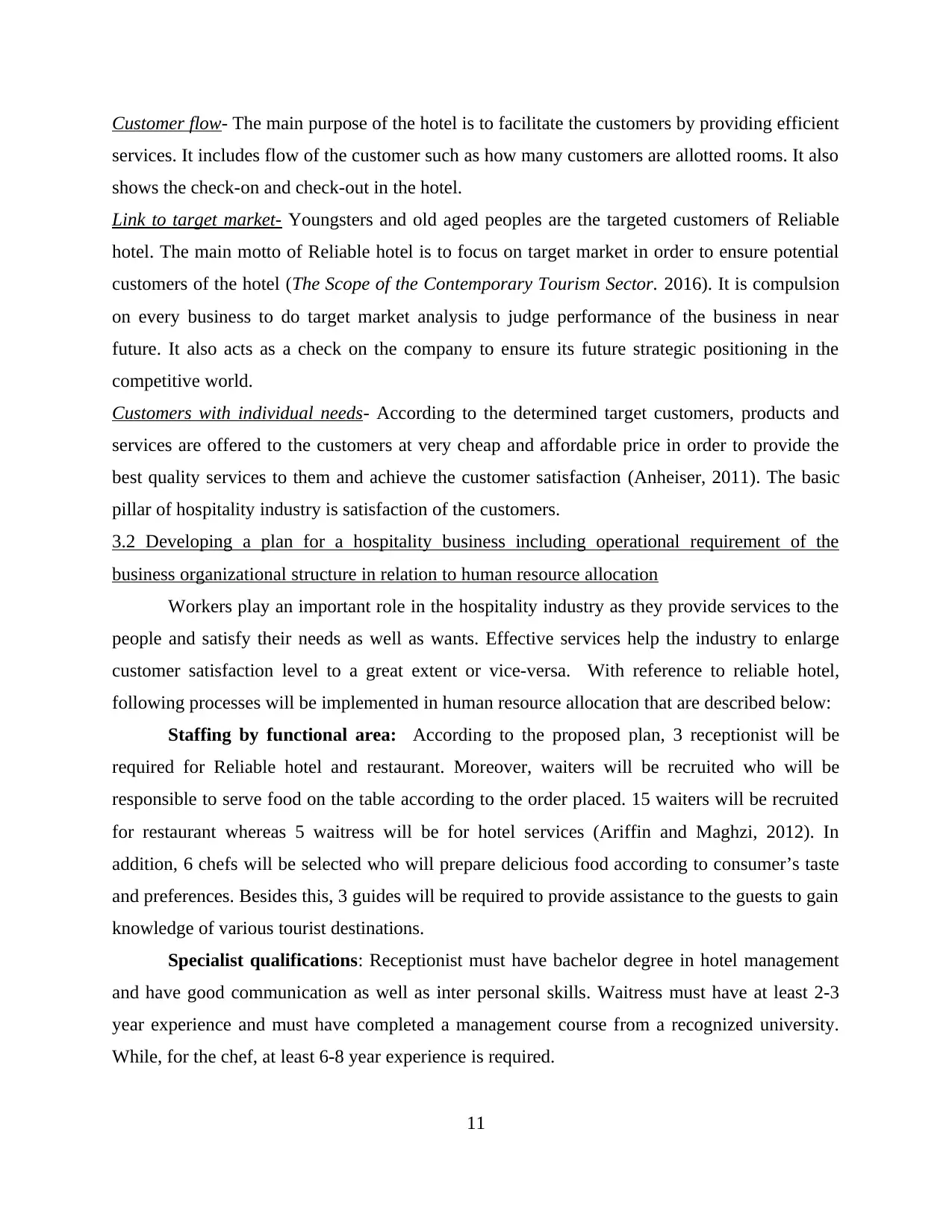
Customer flow- The main purpose of the hotel is to facilitate the customers by providing efficient
services. It includes flow of the customer such as how many customers are allotted rooms. It also
shows the check-on and check-out in the hotel.
Link to target market- Youngsters and old aged peoples are the targeted customers of Reliable
hotel. The main motto of Reliable hotel is to focus on target market in order to ensure potential
customers of the hotel (The Scope of the Contemporary Tourism Sector. 2016). It is compulsion
on every business to do target market analysis to judge performance of the business in near
future. It also acts as a check on the company to ensure its future strategic positioning in the
competitive world.
Customers with individual needs- According to the determined target customers, products and
services are offered to the customers at very cheap and affordable price in order to provide the
best quality services to them and achieve the customer satisfaction (Anheiser, 2011). The basic
pillar of hospitality industry is satisfaction of the customers.
3.2 Developing a plan for a hospitality business including operational requirement of the
business organizational structure in relation to human resource allocation
Workers play an important role in the hospitality industry as they provide services to the
people and satisfy their needs as well as wants. Effective services help the industry to enlarge
customer satisfaction level to a great extent or vice-versa. With reference to reliable hotel,
following processes will be implemented in human resource allocation that are described below:
Staffing by functional area: According to the proposed plan, 3 receptionist will be
required for Reliable hotel and restaurant. Moreover, waiters will be recruited who will be
responsible to serve food on the table according to the order placed. 15 waiters will be recruited
for restaurant whereas 5 waitress will be for hotel services (Ariffin and Maghzi, 2012). In
addition, 6 chefs will be selected who will prepare delicious food according to consumer’s taste
and preferences. Besides this, 3 guides will be required to provide assistance to the guests to gain
knowledge of various tourist destinations.
Specialist qualifications: Receptionist must have bachelor degree in hotel management
and have good communication as well as inter personal skills. Waitress must have at least 2-3
year experience and must have completed a management course from a recognized university.
While, for the chef, at least 6-8 year experience is required.
11
services. It includes flow of the customer such as how many customers are allotted rooms. It also
shows the check-on and check-out in the hotel.
Link to target market- Youngsters and old aged peoples are the targeted customers of Reliable
hotel. The main motto of Reliable hotel is to focus on target market in order to ensure potential
customers of the hotel (The Scope of the Contemporary Tourism Sector. 2016). It is compulsion
on every business to do target market analysis to judge performance of the business in near
future. It also acts as a check on the company to ensure its future strategic positioning in the
competitive world.
Customers with individual needs- According to the determined target customers, products and
services are offered to the customers at very cheap and affordable price in order to provide the
best quality services to them and achieve the customer satisfaction (Anheiser, 2011). The basic
pillar of hospitality industry is satisfaction of the customers.
3.2 Developing a plan for a hospitality business including operational requirement of the
business organizational structure in relation to human resource allocation
Workers play an important role in the hospitality industry as they provide services to the
people and satisfy their needs as well as wants. Effective services help the industry to enlarge
customer satisfaction level to a great extent or vice-versa. With reference to reliable hotel,
following processes will be implemented in human resource allocation that are described below:
Staffing by functional area: According to the proposed plan, 3 receptionist will be
required for Reliable hotel and restaurant. Moreover, waiters will be recruited who will be
responsible to serve food on the table according to the order placed. 15 waiters will be recruited
for restaurant whereas 5 waitress will be for hotel services (Ariffin and Maghzi, 2012). In
addition, 6 chefs will be selected who will prepare delicious food according to consumer’s taste
and preferences. Besides this, 3 guides will be required to provide assistance to the guests to gain
knowledge of various tourist destinations.
Specialist qualifications: Receptionist must have bachelor degree in hotel management
and have good communication as well as inter personal skills. Waitress must have at least 2-3
year experience and must have completed a management course from a recognized university.
While, for the chef, at least 6-8 year experience is required.
11
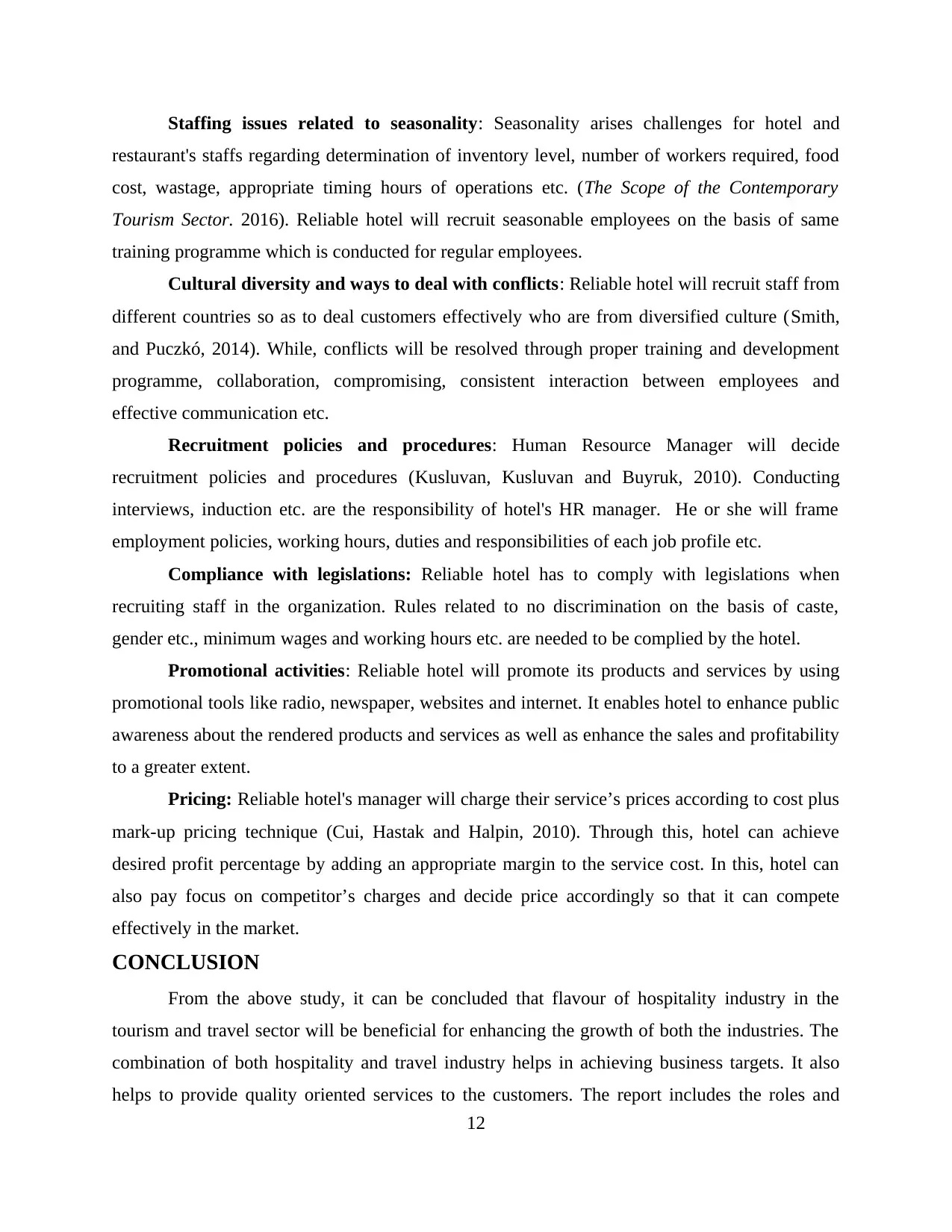
Staffing issues related to seasonality: Seasonality arises challenges for hotel and
restaurant's staffs regarding determination of inventory level, number of workers required, food
cost, wastage, appropriate timing hours of operations etc. (The Scope of the Contemporary
Tourism Sector. 2016). Reliable hotel will recruit seasonable employees on the basis of same
training programme which is conducted for regular employees.
Cultural diversity and ways to deal with conflicts: Reliable hotel will recruit staff from
different countries so as to deal customers effectively who are from diversified culture (Smith,
and Puczkó, 2014). While, conflicts will be resolved through proper training and development
programme, collaboration, compromising, consistent interaction between employees and
effective communication etc.
Recruitment policies and procedures: Human Resource Manager will decide
recruitment policies and procedures (Kusluvan, Kusluvan and Buyruk, 2010). Conducting
interviews, induction etc. are the responsibility of hotel's HR manager. He or she will frame
employment policies, working hours, duties and responsibilities of each job profile etc.
Compliance with legislations: Reliable hotel has to comply with legislations when
recruiting staff in the organization. Rules related to no discrimination on the basis of caste,
gender etc., minimum wages and working hours etc. are needed to be complied by the hotel.
Promotional activities: Reliable hotel will promote its products and services by using
promotional tools like radio, newspaper, websites and internet. It enables hotel to enhance public
awareness about the rendered products and services as well as enhance the sales and profitability
to a greater extent.
Pricing: Reliable hotel's manager will charge their service’s prices according to cost plus
mark-up pricing technique (Cui, Hastak and Halpin, 2010). Through this, hotel can achieve
desired profit percentage by adding an appropriate margin to the service cost. In this, hotel can
also pay focus on competitor’s charges and decide price accordingly so that it can compete
effectively in the market.
CONCLUSION
From the above study, it can be concluded that flavour of hospitality industry in the
tourism and travel sector will be beneficial for enhancing the growth of both the industries. The
combination of both hospitality and travel industry helps in achieving business targets. It also
helps to provide quality oriented services to the customers. The report includes the roles and
12
restaurant's staffs regarding determination of inventory level, number of workers required, food
cost, wastage, appropriate timing hours of operations etc. (The Scope of the Contemporary
Tourism Sector. 2016). Reliable hotel will recruit seasonable employees on the basis of same
training programme which is conducted for regular employees.
Cultural diversity and ways to deal with conflicts: Reliable hotel will recruit staff from
different countries so as to deal customers effectively who are from diversified culture (Smith,
and Puczkó, 2014). While, conflicts will be resolved through proper training and development
programme, collaboration, compromising, consistent interaction between employees and
effective communication etc.
Recruitment policies and procedures: Human Resource Manager will decide
recruitment policies and procedures (Kusluvan, Kusluvan and Buyruk, 2010). Conducting
interviews, induction etc. are the responsibility of hotel's HR manager. He or she will frame
employment policies, working hours, duties and responsibilities of each job profile etc.
Compliance with legislations: Reliable hotel has to comply with legislations when
recruiting staff in the organization. Rules related to no discrimination on the basis of caste,
gender etc., minimum wages and working hours etc. are needed to be complied by the hotel.
Promotional activities: Reliable hotel will promote its products and services by using
promotional tools like radio, newspaper, websites and internet. It enables hotel to enhance public
awareness about the rendered products and services as well as enhance the sales and profitability
to a greater extent.
Pricing: Reliable hotel's manager will charge their service’s prices according to cost plus
mark-up pricing technique (Cui, Hastak and Halpin, 2010). Through this, hotel can achieve
desired profit percentage by adding an appropriate margin to the service cost. In this, hotel can
also pay focus on competitor’s charges and decide price accordingly so that it can compete
effectively in the market.
CONCLUSION
From the above study, it can be concluded that flavour of hospitality industry in the
tourism and travel sector will be beneficial for enhancing the growth of both the industries. The
combination of both hospitality and travel industry helps in achieving business targets. It also
helps to provide quality oriented services to the customers. The report includes the roles and
12
⊘ This is a preview!⊘
Do you want full access?
Subscribe today to unlock all pages.

Trusted by 1+ million students worldwide
1 out of 16
Related Documents
Your All-in-One AI-Powered Toolkit for Academic Success.
+13062052269
info@desklib.com
Available 24*7 on WhatsApp / Email
![[object Object]](/_next/static/media/star-bottom.7253800d.svg)
Unlock your academic potential
Copyright © 2020–2026 A2Z Services. All Rights Reserved. Developed and managed by ZUCOL.





